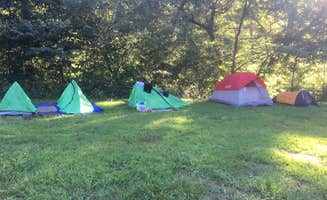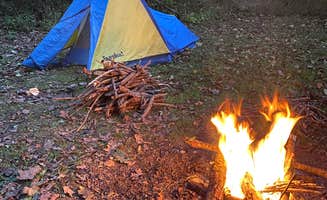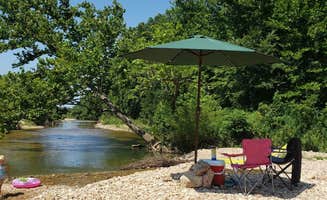Tent camping near Summersville, Missouri offers access to the spring-fed waterways of the Ozarks, where water temperatures typically remain 58°F year-round. The region sits at elevations ranging from 800-1,200 feet with numerous backcountry camping options throughout Mark Twain National Forest and Ozark National Scenic Riverways. Camping permits aren't required for most dispersed sites, though established campgrounds may charge $5-10 per night.
What to do
Kayaking and canoeing on crystal rivers: Turner's mill provides direct access to clear, shallow waters perfect for paddling. "The river is shallow enough to wade across and cool off in," notes camper Jared G., who spent three nights exploring the area's waterways.
Explore historic sites: At Turner's mill, visitors can see preserved mill structures. As Ashley W. notes, it's an "awesome mill you can climb on and awesome spring that makes individual pools." The site combines history with natural features.
Fishing for trout: Mark Twain National Forest offers excellent fishing opportunities. At Noblett Lake, Dave R. observed that it's a "nice place for a picnic, seen people fishing here." McCormack Lake is also known for fishing, with Glen T. describing it as offering "great fishing."
What campers like
Natural swimming areas: Rymers Backcountry Camping offers popular swimming spots. Glen T. describes it as having "a great swimming hole and beautiful scenery with nice tall cliffs it has a couple big rocks out in the water you can swim to and jump off of."
Seclusion during weekdays: Weekday camping provides much greater solitude. At McCormack Lake, camper Delanie J. found it to be a "Secluded Dreamy Lake" where "some people showed up for day use, but the sites were empty. Totally alone with a gorgeous lake."
Spring-fed water features: Many campers appreciate the natural springs. At Turner's mill, Kaylee D. found it to be a "beautiful secluded area" that's "super close to stream/cave/waterfall area. Water from the cave is so fresh and clear!"
What you should know
Site accessibility varies dramatically: Many backcountry sites require appropriate vehicles. At Roberts Field Backcountry Camping, Dave N. warns you "NEED 4wd" as the area is "accessible with a 4wd vehicle with decent ground clearance, or on horseback."
Seasonal closures affect planning: Some sites close during winter months. Loggers Lake Recreation Area operates from April 1 to October 31, while other campgrounds like Akers have specific seasons (April 15 to October 16).
Water quality varies by location: Not all lakes maintain consistent water quality. At McCormack Lake, Shelly S. reported, "The 'lake' looked sickly, with brown foam looking stuff floating on top. The fish were alive and maybe it's a Missouri thing I'm not familiar with."
Some campgrounds have been converted: Always check current status before planning. Josh noted that at Sycamore Loop Dispersed, it's an "ok place to camp, pretty secluded, old campground but most spots no longer seemed camp friendly, as new tree growth has taken over."
Tips for camping with families
Choose sites with restroom access: Akers Group Campground offers amenities important for family camping. Aimee T. notes that "group site three is HUGE, and nice and level" with "a very short path from the site to the current river" and "a pretty basic outhouse up a short trail for camper use."
Select level sites for easier tent setup: Families benefit from flatter terrain. At Cedar Grove/Dee Murray Backcountry Camping, Lisa S. describes it as a "nice Scenic remote area, good for wading and trout fishing" that's "a beautiful place to float with the family."
Consider distance to facilities: Some sites require hiking to reach bathrooms. At Turner's mill, Glen T. notes that "the only issue is the restroom is a little walk from the campsites."
Plan for limited cell service: Most backcountry sites have no reliable communications. Bring physical maps and establish emergency plans before arriving, as network coverage throughout the Ozarks is spotty at best.
Tips from RVers
Avoid narrow access roads: Jerktail Landing Campground presents challenges for larger vehicles. Marty C. warns it's "probably not a good idea to try to bring large camping units to this site" as it's located "down seven and a half miles rough gravel roads."
Length restrictions apply: At Rymers Backcountry Camping, Lula L. cautions there's a "long beautiful drive in, narrow road would not recommend for motorhome over 20' or any large camper as there is no backing up or turn arounds."
Look for designated RV areas: Most primitive sites in the area aren't suitable for larger RVs. Focus on established campgrounds with designated RV spaces and appropriate turning radius for larger vehicles.




